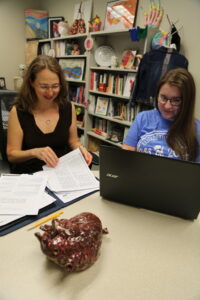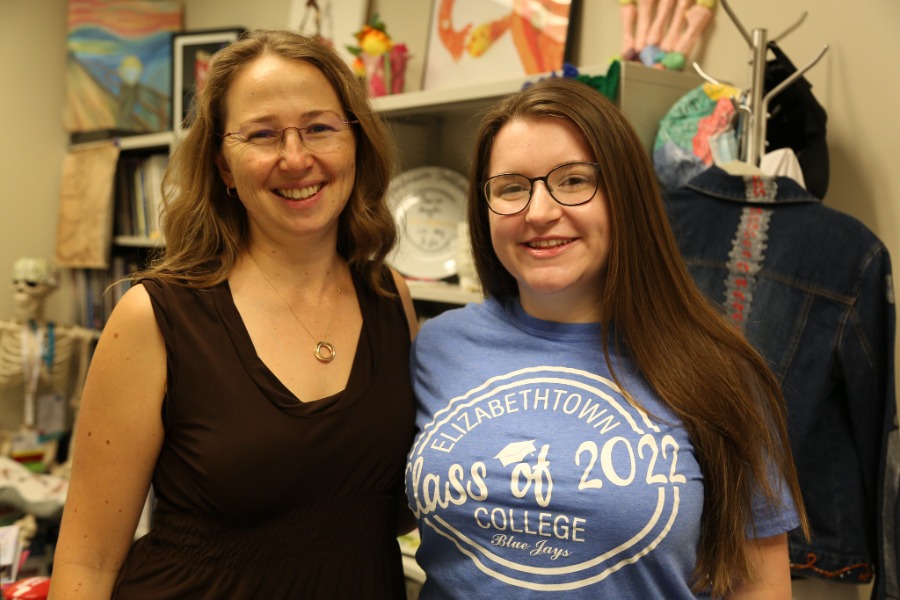Elizabethtown College Neuroscience and Biology major Alexandra Gates ’22 is evaluating the gap between medical education for doctors, paramedics, nurses, and physician assistants and real-world occurrences of discrimination toward the LGBTQIA+ community in treatment, with the goal of issuing a recommendation to medical associations to standardize global policies for inclusion in the field.
The independent student research and collaboration with an Etown faculty mentor is part of the Summer Creative Arts and Research Program (SCARP) program.
Title of Research
Updating Anatomy and Physiology Curriculum to Reflect Diversity, Equity, and Inclusion
Student Researcher
Alexandra Gates ’22 (Neuroscience and Biology major)
Faculty Mentor
Anya Goldina, Associate Professor of Biology
What are you researching?
Alexandra: My research is focused on investigating the healthcare disparities faced by members of the LGBTQIA+ community. The discrimination and inadequate care that members of these communities experience can be partly attributed to the non-inclusive medical education of healthcare providers. My research aims to highlight the gap between scientific understanding of the extent of natural variation within human reproductive systems and how that variation is addressed in the medical curricula. Based on my findings, I aim to develop recommendations to create curricula that reflect scientifically accurate information to better train healthcare providers capable of caring for all individuals.
Why did you choose this topic?
Alexandra: As an aspiring physician, I have always been fascinated with the science of the human body and, over the course of my education at Elizabethtown College, I have gained a great appreciation for the complexities and diversity inherent to it. Following the publication of a news article detailing the healthcare discrimination faced by members of the LGBTQIA+ community, my research mentor encouraged me to combine my education with my passion for social justice to enact a change.
My hope is that, by highlighting the inadequate educational curricula currently used to train healthcare providers, the responsible professional associations and schools will be encouraged to update their curricula and begin uprooting this discrimination at its source. Everyone has a right to accessible, quality healthcare from competent, trained professionals, and I believe that everyone deserves the comfort of knowing that, in an emergency, they will not be alone. It is this belief, and my drive to see it become a reality, that inspires and fuels my research.
What is the most interesting aspect of this research?
Alexandra: One of the most interesting aspects of my research is how quickly the area is evolving. The COVID-19 pandemic put the spotlight on the U.S. healthcare system, and in turn brought attention to the systemic racism and LGBTQIA+ discrimination inherent within it. As a result, the number of studies investigating these issues has greatly increased, and each day, new data emerges that brings added nuance and meaning to my project. Furthermore, with a topic at the forefront of many social and political spheres, the events of each day influence the way I build my argument and illustrate my point. In these ways, my work feels dynamic and exciting – it is more than a research project; it is a living, breathing movement that I am proud to take part in.
How has your faculty mentor helped you?
Alexandra: Dr. Goldina has been an exemplary mentor throughout this experience. She was the one who inspired and encouraged me to begin this project, so I would not be where I am now without her. Since its inception, she has served as an instrumental guide by providing endless expertise, equipping me with ample resources, and always pushing me to think critically. I know I will always be able to turn to her for guidance, constructive criticism, and encouragement. Dr. Goldina is the keystone of my academic support network, and I am incredibly thankful for all the time and energy she devotes to my project and my growth as a scientist.
Hear from the faculty mentor – Anya Goldina
“Social change can only occur when we identify an injustice and are willing to put forth the necessary efforts to change the status quo,” Goldina said. “Alex’s project is focusing on addressing an inequity that has been experienced in healthcare access for members of the LGBTQIA+ community for years.
“By identifying gaps in expectations and learning outcomes, we can begin to develop strategies to address these gaps through intentional changes in our medical and science curricula, providing medical professionals the knowledge and tools they need to deliver quality care for all people.”

